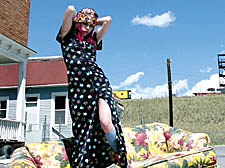|
|
 |
| |

Fairuza Balk in Don’t Come Knocking |
Wim and vigour with Tim
DON'T COME KNOCKING - Directed by Wim Wenders
Certificate 15
SAM Shepard stars in this lost-your-way semi-comic, semi-tragic
film directed by Wim Wenders.
The pair have got good pedigree together: Shepard was in Wender’s
Paris, Texas in the early 1980s.
Wender’s filmography includes such gems as the seminal
piece on Cuban music, the Buena Vista Social Club, which he
made with blues guitar legend Ry Cooder.
Add to this mix Tim Roth, and the basics of the film are right.
His face was made for a film like this. He grimaces in to the
winds that sweep across the forgotten towns of the mid-west.
He added English grit to both Reservoir Dogs and Pulp Fiction,
and always brings an intensity to his roles.
Shepard, who co-wrote the film with Wenders, plays a fading
star of cowboy movies who has lost his way. Here we have a Marlborough
Man facing a mid-life crisis.
After throwing his 10-gallon hat onto the hat stand and letting
the swing doors of the saloon slam shut behind him, he goes
in search of his family. They are a scattered bunch, including
a mother (Eva Marie Saint) he hasn’t seen for 30 years.
Such a span of time means there is a fair amount of catching
up to do – something that seems to frighten Howard. As
soon as she has the kettle on, he slips off again, to find the
son he never knew he had, who his mother informs him exists.
And for Howard, the visit home also brings an emptiness. It
is the realisation that so much has happened in the intervening
years. Shepard’s haunting ‘the 1970s were only yesterday’
look is well delivered and poignant.
The mother of the child was from Montana, so Howard heads that
way for more moping about the times-gone-by, lost opportunities,
the whisky bottles he has finished and young ladies he has taken
advantage of.
And when the couple – and their offspring – finally
meet, Howard realises that even this has not left him as fulfilled
he hoped such a reunion would leave him with.
The dialogue and characterisation fail to inspire, but the photography
mimics the emptiness of the main characters soul.
Tim Roth’s studio executive character gives an interesting
counter the misery of Howard – and is a refreshing break
from his regular devil-may-care roles. |
|
 |
|

